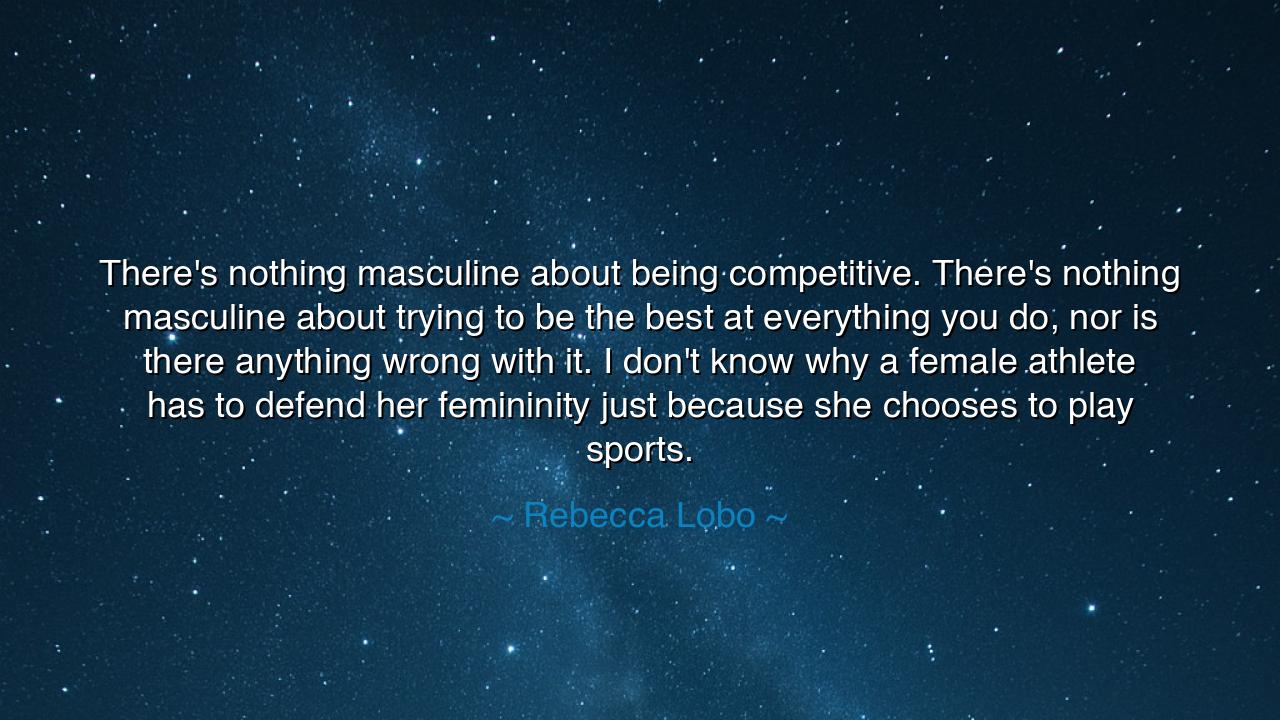
There's nothing masculine about being competitive. There's
There's nothing masculine about being competitive. There's nothing masculine about trying to be the best at everything you do, nor is there anything wrong with it. I don't know why a female athlete has to defend her femininity just because she chooses to play sports.






When Rebecca Lobo declared, “There’s nothing masculine about being competitive. There’s nothing masculine about trying to be the best at everything you do, nor is there anything wrong with it. I don’t know why a female athlete has to defend her femininity just because she chooses to play sports,” she struck at the heart of one of humanity’s most enduring illusions: that strength, ambition, and the fire of competition belong only to men. Her words are not only a defense of women in sport but a proclamation that the essence of striving is beyond gender—it is the breath of the human spirit itself.
The ancients themselves knew this truth, though their societies often buried it beneath layers of custom. Consider the warriors of Sparta, where women trained in running, wrestling, and javelin, their bodies honed in strength to give birth to strong children and to embody the city’s valor. They were not diminished for their might; they were honored. Yet in other lands, the same qualities were shackled, and women were forced to defend their dignity simply for daring to rise above the shadows. In Lobo’s words, we hear both a lament of injustice and a cry for restoration—restoration of what has always been true: that competition is not masculine, but human.
To be competitive is to reach beyond what is, to press the limits of body, mind, and spirit. This drive is not owned by man nor denied to woman; it is a spark placed by the gods in every soul. When Lobo declares that there is “nothing wrong with it,” she affirms the sacred dignity of striving, a dignity that knows no boundaries of sex. To strive is to live fully, to honor the gifts one has been given, and to refuse to bury them in the ground.
History shows us shining examples. Recall Joan of Arc, the young maiden who took up arms not for vanity but for conviction. She led armies, outwitted generals, and bore the weight of a crown’s destiny on her shoulders. Her femininity was not destroyed by her courage—it was illuminated by it. She proved to the world that valor is not bound by the body but by the spirit. Likewise, every female athlete who enters the arena writes a similar testimony: that in sweat, in rivalry, in the pursuit of greatness, there is nothing to prove but one’s own strength.
And yet, society often places its burdens on women, demanding they defend their femininity, as though it were threatened by the swing of a bat, the sprint of a race, or the clash on a court. Lobo’s question, “Why must she defend it?” is both a rebuke and a summons. For true femininity is not diminished by strength; it is enriched by it. To require a defense is to reveal a society blind to the full glory of the human form and spirit.
The lesson here is clear: we must cast away false chains that bind qualities of strength, ambition, and courage to one sex alone. Every soul, whether male or female, has the right—and the duty—to strive for excellence. To compete is not to reject one’s nature, but to fulfill it. The athlete, whether man or woman, is not less for striving but more, not diminished by the arena but enlarged by it.
Practically, let this teaching call us to action: Encourage the young, whether daughters or sons, to compete boldly without apology. Teach them that to try, to train, to strive for mastery is not shameful but noble. And when they face those who mock, let them answer as Lobo did—with dignity, with clarity, with the unshakable truth that greatness belongs to all who pursue it.
Thus, Rebecca Lobo’s words stand as a pillar of wisdom for future generations: competition is human, not masculine; ambition is noble, not shameful; femininity is not a fragile ornament to be defended, but a strength to be lived. Let us honor this truth, and in doing so, set all who strive free to rise without apology into the fullness of their destiny.






AAdministratorAdministrator
Welcome, honored guests. Please leave a comment, we will respond soon